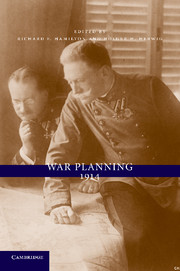Book contents
- Frontmatter
- Contents
- List of Maps
- Contributors
- Acknowledgments
- 1 War Planning: Obvious Needs, Not So Obvious Solutions
- 2 Austria-Hungary
- 3 German War Plans
- 4 War Planning and Initial Operations in the Russian Context
- 5 France
- 6 Great Britain
- 7 Italy
- 8 Conclusions
- Appendix: Suggested Reading
- Index
- References
8 - Conclusions
Published online by Cambridge University Press: 27 January 2010
- Frontmatter
- Contents
- List of Maps
- Contributors
- Acknowledgments
- 1 War Planning: Obvious Needs, Not So Obvious Solutions
- 2 Austria-Hungary
- 3 German War Plans
- 4 War Planning and Initial Operations in the Russian Context
- 5 France
- 6 Great Britain
- 7 Italy
- 8 Conclusions
- Appendix: Suggested Reading
- Index
- References
Summary
Why did none of the “war plans” of 1914 succeed? Why did they all prove to be inadequate in some way or another? Why did the much-anticipated Armageddon not occur either in Galicia or in northern France? And why were the troops not home by Christmas after the “short, cleansing thunderstorm” predicted by both popular and military writers? The authors of the foregoing essays have addressed these questions through evaluations of the individual war plans of the great powers in 1914. War plans, in the inimitable words of historian Dennis Showalter, were “the nineteenth-century intelligence equivalent of the medieval knight's Holy Grail.”
“The history of the campaign of 1914 is nothing else but the story of the consequences of the strategical errors of the War Plan.” With these critical words, General N. N. Golovin sought to explain the Russian debacle of 1914. There obviously was no doubt in his mind that war plans existed – at least in Russia – on the eve of the July Crisis 1914 and that the opening moves of World War I were executed by the great captains on the basis of the plans at hand. In Germany, Staff Chief General Wilhelm Groener after the war spoke of the “symphony” of the Schlieffen Plan and of the “conductor” (Helmuth von Moltke the Younger) who “bungled” its execution.
For the historian of today, the task is not so simple nor the path so straightforward.
- Type
- Chapter
- Information
- War Planning 1914 , pp. 226 - 256Publisher: Cambridge University PressPrint publication year: 2009
References
- 1
- Cited by



